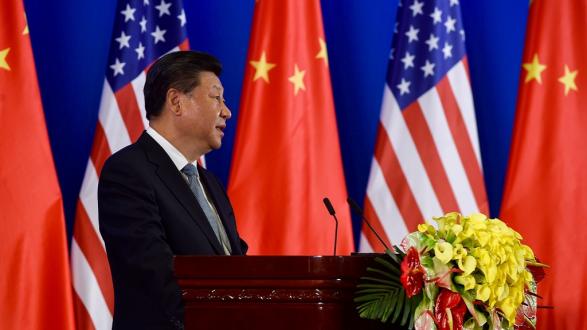My first overseas assignment in the U.S. Foreign Service was in J 96 J as a vice consul stationed at the U.S. consulate in Hong Kong, at the time a British Crown colony. China was a poor and isolated country then. Enemies during the Korean War, the United States had the Chinese economy under commercial and financial embargo and, diplomatically, we recognized the Republic of China government exiled in Taiwan as the legitimate authority over the entirety of China.
The situation on the mainland itself was opaque. Information as to what was going on in China was very hard to obtain, even from nearby Hong Kong. The border was effectively closed. While I served in Hong Kong, we even had difficulty confirming the fact of a then ongoing famine in China.
It was not until a decade later that relations between the People’s Republic of China and the United States began to thaw with the historic meeting in Beijing between President Nixon and Chairman Mao Tse-tung in February 1972. As a member of the National Security Council staff at the time, I was privileged to accompany Secretary of State Henry Kissinger on one of his follow-up visits to China in June 1972 and was able to hear personally the expressions of hope Chinese leaders placed in this embryonic U.S.-PRC relationship.
There are definitely elements of rivalry and antagonism in the U.S.-China relationship that were not there before, at least not at the same level of intensity. But there are also some positive elements in the situation.
It was seven more years before diplomatic relations were established in I 979 and the trade embargo lifted. This momentous development in our relationship with the PRC coincided with the advent of Deng Xiaoping’s reforms and China’s strategic decision to integrate itself with the global economy. Trade between our two countries at that time was almost nil. By 1985, two-way merchandise exchanges were at about $8 billion. In 2017, the comparable figure was over $600 billion.
Unlike our economic relationship with Russia, these high numbers reflect a level of very significant commercial engagement between the United States and China. A complete economic embargo against China today would be next to impossible without contemplating drastic adverse consequences for our own economy. Our trade with Russia is negligible in comparison.
To be sure, China’s dramatic economic growth has also entailed a corresponding advance in its military, technology, and espionage capabilities. This should not be surprising, given that China is today a peer of the United States in the economic realm. And there are definitely elements of rivalry and antagonism in the relationship that were not there before, at least not at the same level of intensity. The issue of the South China Sea and intellectual property theft are examples of current tension points between us.
An indispensable starting point for dealing with China is reciprocal efforts to understand each other’s societies through language study, educational exchanges, and other forms of people-to-people activity and public diplomacy.
But there are also some positive elements in the situation. China appreciates the benefits that have accrued to it because of the post-World War II order and has a vested interest in its preservation. This is especially true since it joined the World Trade Organization in December 2001. What China does seem to want is a stronger voice and participation in the governance of the institutions that have implemented this order. And I would suggest that our relationship can be managed and adjusted to take new concerns on both sides into account rather than allowing the relationship to slide into confrontation.
This is not to say that managing the U.S.-China relationship will somehow be an easy matter. Ever since our opening to China in 1972, U.S. presidents and secretaries of state have always found time to devote to what has undoubtedly become the most important bilateral relationship we have, but the engagement has to be persistent and at all levels of government and, indeed, society at large.
Throughout my career, including my time as ambassador to the United Nations and to Iraq as well as the director of national intelligence and the deputy secretary of state, I have seen rivalry, confrontation, and cooperation up close with many different nations and groups. An indispensable starting point for dealing with China is reciprocal efforts to understand each other’s societies through language study, educational exchanges, and other forms of people-to-people activity and public diplomacy. Building on that, we need broad contact through our respective academic, business, and government sectors. In short, we need to get to know each other as well as possible.
Continuous diplomatic dialogue between our two governments, at both civilian and military levels, is indispensable—to avoid misunderstandings and potential altercations but, equally important, to continuously seek and develop areas for bilateral and global cooperation.
But on top of that, continuous diplomatic dialogue between our two governments, at both civilian and military levels, is indispensable—to avoid misunderstandings and potential altercations but, equally important, to continuously seek and develop areas for bilateral and global cooperation.
It boils down to this: a world in which the United States and China are at serious odds will be, at best, in a mode of damage limitation, if not worse; whereas if the United States and China find ways to cooperate, especially on global issues, there is better hope of addressing the most pressing problems of our times.
_______________________
John Negroponte was the inaugural Director of U.S. National Intelligence from 2005-2007. He has been U.S. ambassador to Honduras, Mexico, the Philippines, the United Nations, and Iraq. In Washington he served twice on the National Security Council staff, first as Director for Vietnam in the Nixon administration and then as Deputy National Security Advisor under President Reagan.
The views and opinions expressed here are those of the author and do not necessarily reflect the official policy or position of the Pacific Council.




